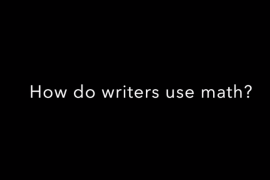If there’s one thing most folks assume about me, it’s this: That I am some sort of mathmagician, able to solve math problems in a single bound — quickly, in public and with a permanent marker.
Nothing could be farther from the truth.
I don’t like what I call performance math. When I’m asked to divvy up the dinner tab (especially after a glass of wine), my hands immediately start sweating. When friends joke that I can find 37% of any number in my head, I feel like a fraud. I’m not your go-to person for solving even the easiest math problem quickly and with little effort.
Truth is I really cannot handle any level of embarrassment. And I’m very easily embarrassed. I’m the kind of person who likes to be overly prepared for any situation. This morning, before contacting the gutter company about getting our deposit back because they hadn’t shown up, I had to re-read the contract and literally develop a script in my head. What if I misunderstood something and was — gasp! — wrong about the timeline or terms of our contract?
Oh yeah, and I hate being wrong. About anything.
In short, I’m not much of a risk taker. Unlike many of my friends and some family members, I can’t stand the thought of failing publicly. Imagine writing a math book with this hang up! Thank goodness for two amazing editors, who checked up behind me.
I’m also not a detailed person. Not one bit. I’m your classic, careless-mistake maker — from grade school into grownuphood. I’m much more interested in the big picture, and I am easily lured by the overreaching concepts, ignoring the details that can make an answer right or wrong.
For years and years, I worried about this to no end. How could I be an effective teacher, parent, writer, if I didn’t really care about the details or I had this terrible fear of doing math problems in public? What I learned very quickly in the classroom was this: Kids needed a math teacher like me, to show them that failing publicly is okay from time to time and that math is not a game of speed or even absolute accuracy. (It’s never a game of speed. And it’s frequently not necessary to have an exact answer.)
Two weeks ago, as I sat down with my turkey sandwich at lunch, the phone rang. It was a desperate writer friend who was having some trouble calculating the percentage increase/decrease of a company’s revenue over a year. (Or something like that. I forget the details. Go figure.) She really, really wanted me to work out the problem on the phone with her, and I froze. I felt embarrassed that I couldn’t give her a quick answer. And I worried that I would lose all credibility if I didn’t offer some sage insight PDQ.
But since I have learned that math is not a magic trick or a game of speed, I took a deep breath, gathered my thoughts and asked for some time. Better yet, I asked if I could respond via email, since I’m much better able to look at details in writing than on the phone. I asked her to send me the information about the problem and give me 30 minutes to get back with her.
Within 10 minutes, I had worked out a system of equations and solved for both variables. She had her answer, and I could solve the problem without the glare of a spotlight (even if it was only a small spotlight).
My point is this: Math isn’t about performing. If you like to solve problems in your head or rattle off facts quickly or demonstrate your arithmetic prowess at cocktail parties, go for it. That’s a talent and inclination that I sometimes wish I had. But if you need to retreat to a quiet space, where you can hear yourself think and try out several methods, you should take that opportunity.
Anyone who criticizes a person’s math skills based on their ability to perform on cue is being a giant meanie. And that includes anyone who has that personal expectation of himself. There’s no good reason for math performance — well, except for Mathletes, and those folks have pretty darned special brains.
Do yourself a favor and skip math performance if you need to. I give you permission.
Do you suffer from math performance anxiety? Where have you noticed this is a problem? And how have you dealt with it?








Comments are closed.